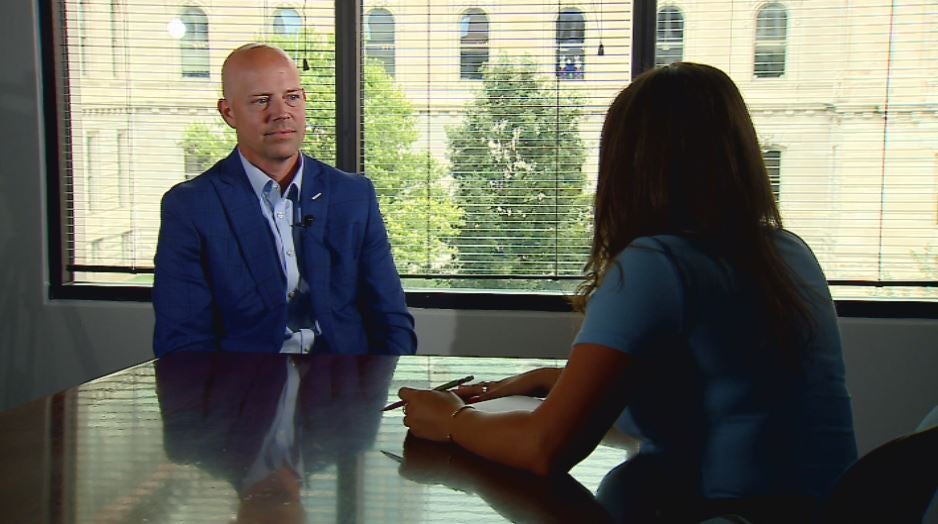DCS director wants to transform agency
INDIANAPOLIS (WISH) — The new director of Indiana’s Department of Child Services says he’s working to transform the agency.
Adam Krupp, who was appointed in January, spoke with I-Team 8 about his first few months on the job and his vision for the department.
Project “Awaken”
“Today’s a new day,” Krupp said.
Krupp has been working as the director for about six months now. Earlier this summer, the department rolled out a new initiative called “Awaken.”
The project redirects $4 to $8 million toward boosting child safety. It comes after Gov. Mike Braun’s team found the department needs restructuring.
Part of that restructuring prompted the agency’s once 18 regions across the state to be cut down to five. The move allows regional directors and child welfare workers to be more connected to leadership, including Krupp.
I-Team 8 asked Krupp who was cut and how the change could impact care.
“We eliminated a few layers of upper management,” he said. “I think when you think about my role as director, and then family case managers on the front lines of child abuse and neglect, we had eight layers of supervision between us, and so I wasn’t close enough to the front lines.”
He says many of the people in the upper management positions have found new roles at DCS.
Krupp says the move means much of the “back office” resources have been moved to support the “front office” through additional resources and easier access to care for kids in need.
Changing turnover culture
Krupp says he’s visited 60 of the 92 Indiana counties, listening to staff and working to change the culture of turnover.
In the 2023 fiscal year, 739 of the department’s more than 2,000 case managers left. The agency then hired 890 caseworkers. Currently, DCS has about 4,000 workers.
I-Team 8 asked Krupp how turnover is now. He says it still remains at 30%, but wants to focus on supporting case managers on the job to help avoid stress that leads to burn out.
“Our turnover, importantly, will always be a little bit higher than other agencies,” he said. “Having worked in a handful myself, I can confidently and competently compare the work that our team does to the work that others do, which is in no way meant to be disrespectful or judgmental. But, you know, when I say our team members are on the front lines of child abuse and neglect .. they are putting themselves in the shoes of first responders.”
When he took the job earlier this year, the agency needed over 300 case managers to properly care for families. Now, they only need about 150, he says.
“We need to go above and beyond to retain them by supporting them and showing them that they are appreciated and valued just because of what their day to day is like,” Krupp said.
Increasing transparency
Krupp acknowledges the transparency concerns that have long been associated with the department.
I-Team 8 specifically asked him about the time it takes for the agency to share information on child fatalities or near child fatalities.
As it stands now, the department releases a report once a year, but it can often be delayed. The 2023 report was released at the start of 2025.
Krupp says he hopes they can find way to share more publicly, because he believes “Hoosiers deserve it,” but wants to make sure state law is respected.
Indiana is strict when it comes to child welfare confidentiality. Krupp says is it is vitally important to protect kids when it comes to confidentiality, but understands the need for the public to get information.
Failed House Bill 1152 would have required DCS to public a report within 90 days of every child fatality or near fatality. It would have also required the department to say if the state hotline before a child died.
I-team 8 asked Krupp if he thinks the bill should have moved forward.
“Our concerns with the legislation were more about federal funding and not putting that at risk,” Krupp said. “We always want to make sure that we are candid about the fact that the legislature, they are the policy makers, we’re the administrators, and it is within their purview and their prerogative to advance policies that they believe are appropriate.”
Krupp says he is open to working with the legislature in the future in order to find ways to offer more transparency, while still protecting the agency’s budget.
Cost concerns
I-Team 8 asked Krupp about the agency’s strained budget.
Krupp says he is mindful that every dollar they spend is a tax payer dollar.
Krupp says the cost of child welfare continues to skyrocket, especially in the last five years.
He’s looking to reevaluate the spending, saying he plans to have conversations with some of the organizations they partner with and the cost of their services. He wants to collaborate with them on ways to make the cost more reasonable.
“I think it’s time for all of us to say, ‘Look, this is not sustainable,’” Krupp said.
About The Author
You may also like
-
Seasonable into the weekend, nice taste of fall-like air into next week | Aug. 20, 2025
-
Indiana Commission for Higher Education to vote for Secretary Jenner as new Commissioner
-
Pete Buttigieg set to join Indiana University lecture series
-
Police: Drunk Daleville man killed 1 person, injured another in crash
-
Gainbridge Fieldhouse to host Wrestlepalooza

